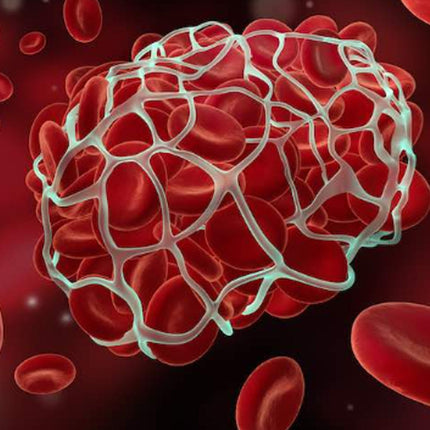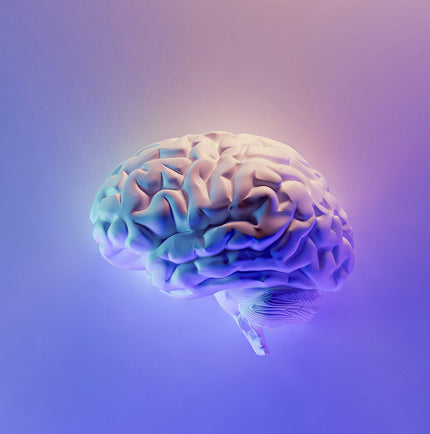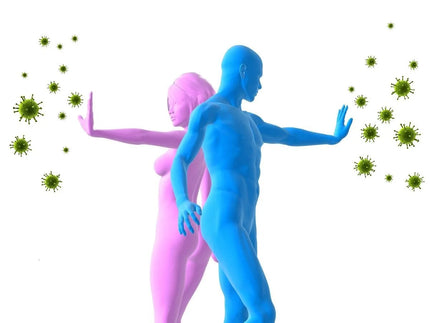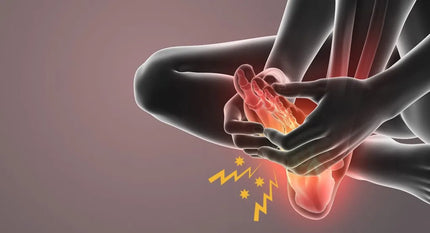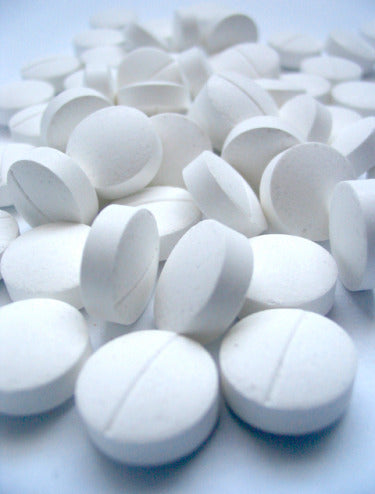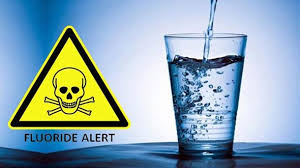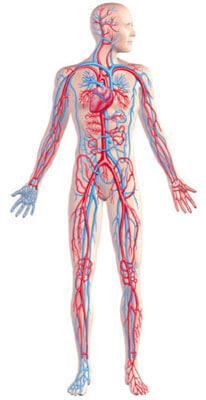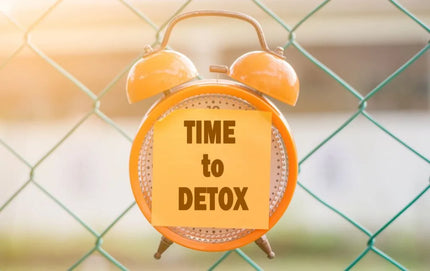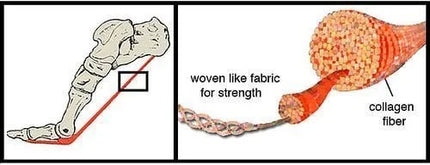Tax included and shipping calculated at checkout
Is it possible to be dehydrated, but not feel thirsty?
YES. People can be dehydrated without even realising it. The thirst mechanism may not be working properly to alert us to this state. It usually gets less effective at alerting us to dehydration the older we get. Dehydration, or less than optimal levels of water in cells, can cause many health problems, including anxiety and mental stress, hypertension (high blood pressure), muscle spasms and cramps, heart arrhythmia, skin disorders and premature ageing, weakness and dizziness.

When the body is dehydrated it can also cause oedema, a pooling of fluids around the ankles or puffiness around the eyes. The reason for fluid retention is usually because the body cannot properly eliminate wastes when there is not enough free water flowing through the system. In order to protect the vital organs the body holds back and pools water in regions where the toxicity needs to be diluted most (eg. sites of inflammation or acidity). Waste products can also pool up and cause swelling in the lymph system - the body's protein waste disposal system. This is another case where toxic residues need to be diluted with more water. In other words, dehydration and the consequent toxic build-up, tends to cause blockages in the tubular networks of our body, acidosis and low-oxygen, low-energy states.
How do we Diagnose Dehydration?
Actually, according to a recent study review, no gold standard biochemical hydration index exists for accurate medical diagnosis. Doctors mainly use clinical biomarkers in blood and urine, blood pressure assessment and symptoms like eye dryness and mouth mucous wetness to diagnose dehydration. You can use the 'dry eyes', 'no spit' or dark smelly urine biomarkers to give you clues too. There are other indicators as well, such as headaches, brain fog or dizzyness, and heart palpitations. Even anxiety can be a symptom of dehydration.
What causes dehydration?
- NOT DRINKING ENOUGH WATER - OR DRINKING DE-MINERALIZED WATER (NOT ENOUGH ELECTROLYTES)
- STRESS. The more stress we experience (of any kind) the more magnesium and water are lost by cells due to changes in the cell membrane.
- EXCESSIVE PERSPIRATION
- PROCESSED FOODS, sugar, coffee, alcohol. Beverages are liquid foods and require extra work to digest to use the water they contain. Some beverages like coffee and alcohol actually remove more free water from the body than they donate in the liquid!
- CHEMICALS, HEAVY METALS AND PESTICIDES LIKE GLYPHOSATE
- MEDICATIONS, particularly diuretics.
The brain needs a lot of water to function
The availability of free water in the body is essential for electrical conductivity and cell signaling. The brain uses huge amounts of water for its electrical activity and processing. About 80% of the brain is made of water. You can't think properly if you are dehydrated, and many people won't even realise that this could be the cause of their forgetfulness or feelings of anxiety.
Only water does what water does to enable waste removal, cell energy production and conductivity. If anyone says to you they don't need to drink water because they drink other liquids, it should be a health concern.
You need water to make stomach acid
Digestion requires extra water over and above the water contained in the food, in order to make enough stomach acid. It is best to have a glass of water about half an hour before a meal to give it time to pass through. If you drink during a meal you can dilute your stomach acid, which can then lead to reflux and symptoms of IBS.
Stress hormones like cortisol and adrenaline have a dehydrating effect, and dehydration produces more stress hormones, which then cause more dehydration
Dr Batmanghelidj M.D. said in his book, The Body's Many Cries for Water;
"Stress translates in the body into dehydration; in other words, every time you feel stressed, that translates to dehydration, and the reason is that every time you’re stressed you secrete a lot of hormones that break up new material and mop up the free water from the circulation, and all of a sudden you are short of free water... In stress-management you get these hormones—vasopressin, endorphins, prolactin, cortisone-release-factor, and angiotensin, which is activated both at the brain level and at the kidney level. Vasopressin is subordinate to histamine, as a water regulator, and vasopressin itself is a very strong cortisone release factor. When there is dehydration, and you have histamine release, you also have vasopressin release, and you also have tissue breakdown as a result of cortisone release factor." Read More...
Vasopressin is what causes the smooth muscle cells of the cardiovascular system to contract in order to push more water up into the brain because the brain needs more water than the other organs of the body. The brain will always take priority for the water supply in the body. If there is not enough to go around, the cardiovascular system gets squeezed.
For smooth wall muscle fibres to squeeze together in vascular constriction, cells have to depolarise to allow calcium to flood in because calcium is a contracting mineral. It is magnesium that then releases the grip of the calcium which then allows the muscle to relax again, re-inflating with with magnesium and water.
This kind of ion channel switching normally happens very fast. We quickly tense when we have to do something energetic and in a hurry, and we then relax when the urgency is over. But as magnesium gets lower it gets harder to release tension, and muscles can remain 'locked up', with the vascular walls becoming more rigid as calcium accumulates, leading to hypertension (high blood pressure). Over time ligaments, tendons and joints can also become harder and more calcified as a consequence of low magnesium and dehydration.
Electrolytes, such as magnesium in water, improve the pH and hydration capacity of water

The main intracellular electrolytes associated with 'juicy' youthful cells are potassium and magnesium (which work together like partners), while the extracellular dominant electrolytes are sodium and calcium. Chloride is the most abundant mineral electrolyte and represents about 70% of the body's total negative ion content. It is present both in intracellular and extracellular spaces. Chloride is a by-product of the reaction between chlorine and an electrolyte such as potassium, magnesium, or sodium, which are essential for human metabolism. This compounding (sharing electrons in the outer shell) allows the electrolytes to become fully water soluble, ionised and able to be absorbed. Chloride salts are essential for sustaining cell conductivity and human metabolism.
Drinking a balanced electrolyte water works quickly to re-hydrate cells and our cardio-vascular system. However, care must be taken with certain electrolytes because sodium can steal water and exacerbate dehydration, making blood thicker and more voluminous. Excessive sodium pushes up blood pressure. Sodium is of course vital, but it must be balanced with enough magnesium. Magnesium has an affinity with water molecules and helps to structure them in hexagonal liquid crystaline configurations so that the water becomes more hydrating for cells.

In other words, with magnesium more water can get into cells for transport and energy production. It also improves the fluidity of the cardiovascular system. Electrolyte balance is essential. Usually we get more than enough sodium salts from our diet, but its magnesium that is in short supply. It's low in soils and foods, and then we also lose it excessively under stress. However, if you are a very active person and perspire a lot, then you may need to add some extra sodium to your electrolyte water. Some prefer their sodium in the form of sodium bicarbonate which is very alkalizing.
For more information and videos about how to make electrolyte drinking water see our Magnesium Chloride Flakes page.
Sugar is dehydrating - and ageing!
Interestingly, the higher the magnesium levels, the lower the sugar sensitivity. The lower the magnesium levels the higher the sugar sensitivity. It's like a see-saw. Sugar metabolism causes acid by-products and free radicals that, if not buffered by enough electrolytes and antioxidants, lead to a positive charge that depolarises the cell membrane. This makes the cell membrane channels looser and more prone to water loss. Acidosis is a state of dehydration and low oxygen, which means low energy. This kind of acid overload is how proteins like collagen break down. It causes premature ageing.
Membrane electrical potential depends on magnesium
The outside of the cell attracts positive charges, and the inside is electrically negative. This tug-o-war creates a membrane electrical potential holding cell contents in, and keeping extra-cellular elements out. The opening and closing of the channels is also used for signaling and cell communications. Magnesium and water are dominant in controlling this balance.
Scientists Mildred Seelig and Andrea Rosanoff in their book the Magnesium Factor established that magnesium is the key electrolyte responsible for membrane charge and integrity. Cell membranes are made up of a phospholipid bi-layer held together by magnesium ions. If the magnesium level gets too low the membrane can depolarise and lose its charge, thereby becoming 'leaky'. If the membrane becomes too loose you can also lose too much potassium, which can cause a heart attack.

"Virtually all eukaryotic cells (including cells from animals, plants, and fungi) maintain a non-zero transmembrane potential, usually with a negative voltage in the cell interior as compared to the cell exterior... The membrane potential has two basic functions. First, it allows a cell to function as a battery, providing power to operate a variety of "molecular devices" embedded in the membrane. Second, in electrically excitable cells such as neurons and muscle cells, it is used for transmitting signals between different parts of a cell. Signals are generated by opening or closing of ion channels at one point in the membrane, producing a local change in the membrane potential." Read More
With an alkaline structured water (cytoplasm) the water molecules line up their poles like train tracks with tighter spaces in between, thereby not allowing the larger molecules of sodium and calcium inside (during rest phase). When action is required in the sympathetic mode, stress hormones cause magnesium to come out and calcium to move into the calcium channels. When it's time to relax and go back to the parasympathetic mode, calcium comes back out and magnesium moves back into the channels to control the membrane. Read more about water's electrical charge separation in the research of Professor Gerald Pollack.
Magnesium's charge thus helps to hold the water in and keep the cell well hydrated for normal functioning. If the cell loses too much magnesium the membrane loses its integrity and gets ‘leaky’, thereby unable to maintain proper hydration for detox flushing, cell signalling, transport and mitochondrial energy production.
Make drinking water more hydrating with magnesium
Adding Elektra Magnesium chloride flakes to filtered rain water or reverse osmosis filtered water remineralizes, alkalizes and charges up the water to make it more hydrating. The magnesium flakes also contain additional naturally occuring sea trace minerals that provide extra synergistic mineral support.
One pinch (about half a gram) per litre of filtered water makes a beautiful drinking mineral water and adds about 80mg of elemental magnesium to simulate a quality spring water. You can drink more water this way without peeing so often because the water travels through the body more slowly, thereby more thoroughly accessing the tissue cells, rather than quickly transiting the digestive system as with demineralised water. Water without the electrolytes tends to go through the digestive system very quickly, so we don't get the full value from the water. Try magnesium in water for better cellular hydration.
If you want something more convenient to add in your drinking water, try Elektra Magnesium Mineral Supplement for Drinking Water, a purified liquified magnesium chloride concentrate in an easy-to-use bottle. Just count in the drops.
Studies have found that drinking magnesium mineral water every day provides an equivalent amount of magnesium compared to a pharmaceutical supplement.
The recommended average daily water consumption for an adult is 3 litres per 24 hours and more if there is excessive perspiration or chemical and medical interventions which cause dehydration. If you add 80mg of elemental magnesium in water (equivalent to one pinch of magnesium flakes), then 3 litres would equate to 240mg of elemental magnesium. It's still not all that you need, but goes a good way towards overall requirements. Some people can need 1,000mg of magnesium daily if they have high-end needs. In this case they can add transdermal magnesium to make up shortfalls.
Beware of chemicalised tap water, which can impair the digestive system. If you were using tap water in Germany, Switzerland or Austria where they ozonate the water coming from the European Alps full of minerals, you would be fine. This tap water is beautiful to drink, without any bad after-taste. It also has natural magnesium in water that comes down from the mountains.

In some cities in Australia, USA and other western countries however, they add chlorine and industrial grade fluoride which contains heavy metal contaminants. Both of these chemicals kill beneficial gut bacteria like antibiotics, thus interfering with proper digestion and causing IBS symptoms and leaky gut. Fluoride also binds up magnesium. Ingesting both fluoride and magnesium together is like driving with the brakes on. All the good things that magnesium does - like support enzyme activity and metabolism - is the opposite for fluoride. Fluoride inhibits enzyme activity and slows down metabolism. It also promotes acidity. Fluorine is the most tightly binding element on the periodical table of elements. It's like dumping resin into your cells, impeding cell energy production, and making them run more slowly and inefficiently.
It is well known that fluoride suppresses the thyroid by displacing iodine, which is one of the main reasons we now have a thyroid epidemic in Australia, USA and UK (in those cities that fluoridate).
"Lack of iodine shuts down production of thyroxine, the thyroid prohormone that controls metabolism, and, in one way or another, impacts every aspect of health. The resulting hypothyroidism causes weight gain, cold intolerance, dry and prematurely aged skin, depression, constipation, hair loss, memory loss, irritability, increased cholesterol levels, heart disease and loss of libido." Read more:
Iodine is not only important to the thyroid, but also to breast tissue as the breast competes with the thyroid for available iodine. Low iodine leads to fibrocystic tissue cells and higher risk of breast cancer.
Get a good water filter if you are going to drink the tap water: Cheap filters do not get the fluoride out. Make sure to check with the manufacturer of the filter to make sure it gets over 90% of the fluoride out. Boiling tap water may evaporate the chlorine out of it, but the water that's left ends up with a higher concentration of fluoride because it doesn't evaporate or dissipate with the boiling. That means all the tap water you use for cooking will have more concentrated amounts of fluoride.
You also need to watch for manufactured beverages and processed foods because much of it also uses fluoride water in the processing. It is accumulative in cells over time, so older people are carrying a lot more fluoride in their bones and pineal gland than younger people. Fluoride is also a neurotoxin and affects the speed of processing of brain neurons. In other words, it slows down thinking and fogs the brain due to its inhibition of iodine and magnesium.
There will be exposures to fluoride in the environment you won't know about, but if you can manage to avoid the fluoridated drinking water, that is the major part. With extra magnesium in your diet, and magnesium in water, it will help to protect your cells from fluoride toxicity. Magnesium supports your detoxification enzymes to eliminate the chemicals and heavy metals that shouldn't be there.

Apart from a good supply of magnesium in water, another nutritious beverage is a green smoothie or vegetable juice with greens. This 'green' part is chlorophyll and is alkalysing for cells. Magnesium is the centre of the chlorophyll molecule, so it's really magnesium in water coloured green! Adding more green vegetables to your diet means adding more magnesium.
Transdermal Magnesium
Transdermal magnesium is another way to get more magnesium into your body if you have high-end needs. In this way the body can absorb higher amounts compared with oral supplements. Magnesium tablets and powders are harder to digest and absorb because high concentrations of magnesium attract a lot of water and are quickly expelled out the back end! This amount of magnesium in water is way too high, (unless you intend to use it as a laxative). In this case the magnesium is expelled too quickly, but good for bowel elimination. Only amounts that are similar to what is naturally occuring in spring water and foods transits easily across the gut wall to the interior of the body withouot causing a bowel purge.
In addition to soaking with Magnesium Flakes, you can also apply Magnesium Cream and Magnesium Charge Lotion for skin care and muscle massage, and Magnesium Oil Spritz for added magnesium and high end needs. You will still need to drink magnesium in water for optimal hydration of cells and cardiovascular system, but transdermal magnesium gives you a big boost when you need it.

by Sandy Sanderson © 2016-2022








